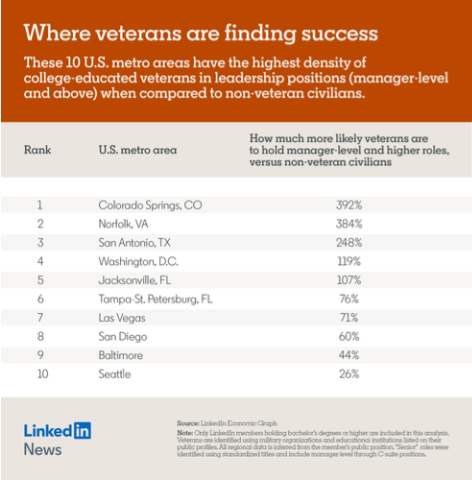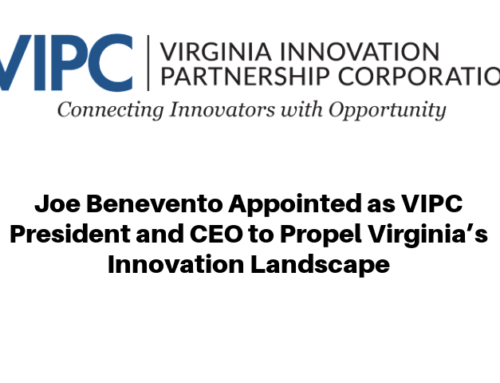From LinkedIn By George Anders
Who wants to hire 2,000 veterans or military spouses this year? Talent-acquisition maestro Tom Downs and his colleagues at the global consulting firm of Booz Allen Hamilton, that’s who.
Candidates from the military community “fit into the whole gamut of what we’re looking for,” Downs explains. That’s especially true for veterans with active-duty experience in Booz Allen’s core consulting specialties, such as program management, cybersecurity and information technology.
Even veterans whose technical skills aren’t 100% of what Booz Allen needs can find support. “Our approach is to hire or help,” Downs says. Often, that means alerting candidates to extra technical certifications that will strengthen their chances. In as little as six to nine months, such candidates can come back stronger and land the jobs they want.
Transitioning from the military tempo to a civilian career is never easy, and I’ve written before about the hardships that many veterans face. But there’s growing recognition of the value that veterans can bring, in terms of universal skills such as leadership, teamwork and ingenuity. So let’s look at what can go right.
The perfect starting point is a fresh analysis by LinkedIn’s Economic Graph team, looking at the metro areas — and the industries — where college-educated veterans have the best shot at rising into leadership positions.

Today’s prospects — as seen in the chart above — are refreshingly wide-ranging. The opportunity map begins with metro areas that include major military bases (or academies), such as Colorado Springs, Norfolk, Va., or San Antonio, Texas. In each of those metros, college-educated veterans are substantially more likely to hold manager-level and higher roles, versus their non-veteran, civilian counterparts.
In such metros, military-honed skills go far. That’s especially true for private-sector businesses that design weapon systems, repair ships or otherwise interact directly with the military. But even retailers, schools and health-care facilities are likely to prize veterans’ experience and leadership potential.
In Norfolk, Dwayne Merritt has turned his Navy experience as an operations specialist into a closely aligned new civilian career as a machinist and emerging team leader at Norfolk Naval Shipyard. It’s a homecoming of sorts for him. “I grew up across the road from the shipyard,” he says.
Such metros’ local culture also makes people with military backgrounds feel appreciated. “When I was in the Navy, people would regularly thank me for my service,” Merritt recalls. “When I’d go into McDonalds in my uniform, people would offer to pay for my breakfast.”
But the latest opportunity map for veterans also highlights metros such as Las Vegas, San Diego, Baltimore and Seattle, where the military’s influence is a much smaller part of the local economy. In those locations, veterans are more likely to be finding opportunities across a wide range of industries.
Also prominent is the Washington, D.C metro. (No. 4 on the list), which offers a triple-play assortment of veteran-friendly opportunities. The region is rich in federal agencies, which often offer hiring preference to veterans. Another hiring cluster ties to the abundance of military bases in the area. And a wide range of consultants, lobbyists and other defense-focused entities offer attractive career paths for veterans, too.
Nationwide, LinkedIn data shows that the most common career field for college-educated veterans in leadership roles is defense and space manufacturing (7.0%). That’s closely followed by information technology services and consulting (also 7.0%).
The rest of the veterans’ top 10 list includes civilian roles in the armed forces, followed by financial services, government administration, hospitals and health care, business consulting and services, construction and higher education.
What’s propelled veterans to prominence in IT and tech roles? Booz Allen’s Downs, an Army veteran himself, points out that each military branch (Army, Navy, Air Force, etc.) has an extensive commitment to cybersecurity – which means veterans in that field enter the civilian market with in-demand skills.
In addition, post-9/11 initiatives have widened opportunities for veterans and current-duty military to pursue higher education. “We’re seeing a lot more veterans with masters’ degrees and even Ph.D.s,” Downs says. “They’re going beyond just an undergraduate education.”
Finally, the rise of coding academies and tech bootcamps during the past decade makes tech careers much more accessible for millions of people, including many veterans. With single-subject certificates being awarded in a matter of months – as opposed to a university degree that can take four years or more – candidates can qualify for the jobs they want far more easily.
Methodology
Only LinkedIn members holding bachelor’s degrees or higher are included in this analysis. Veterans are identified using military organizations and educational institutions listed on their public profiles. All regional data is inferred from the member’s public position. “Senior” roles were identified using standardized titles and include manager-level through C-suite positions.
(LinkedIn data scientists Michael Lombard, Danielle Kavanagh-Smith and Dana Hagist contributed to this article.)






